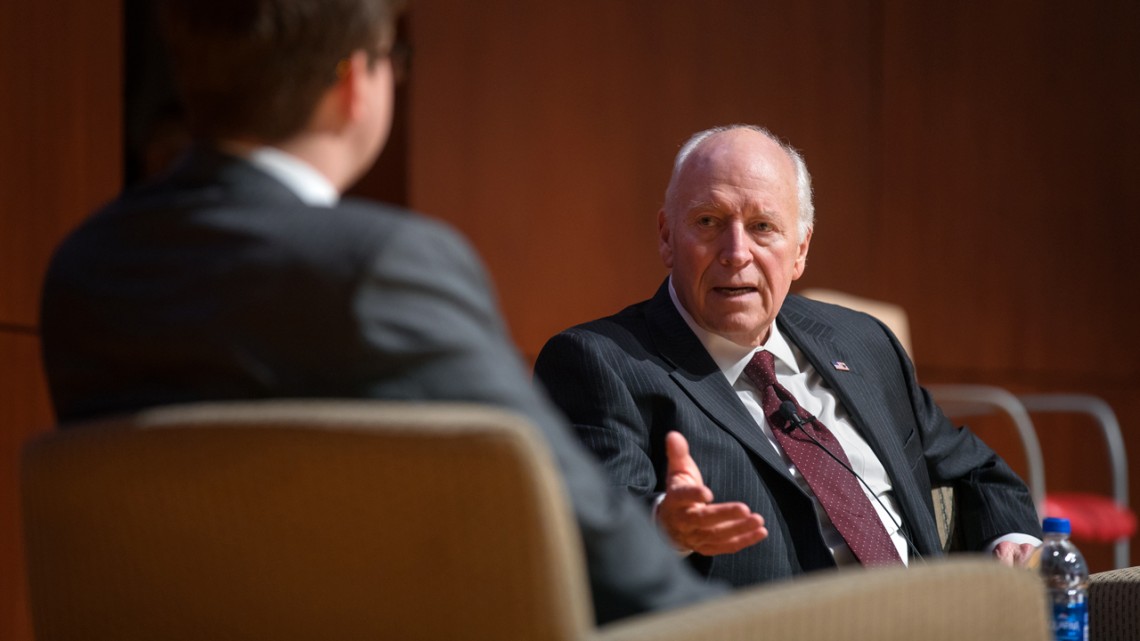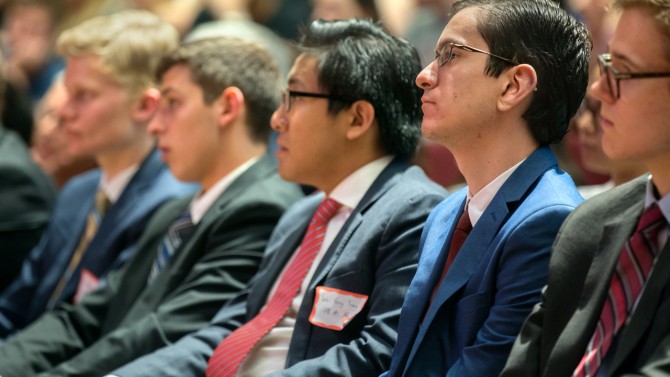
Former Vice President Dick Cheney, right, speaks with Austin McLaughlin '18, president of the Cornell Republicans, during the question-and-answer portion of Cheney's appearance May 1 in Call Auditorium.
Former VP Cheney gives wide-ranging talk, Q&A
By Tom Fleischman
Former Vice President Dick Cheney addressed the current geopolitical climate, the Trump White House and other issues during a wide-ranging talk May 1 at Call Auditorium.
The 77-year-old Republican from Wyoming discussed national security, Asia and the Middle East, and the current administration and its positions regarding the United States’ preeminence globally.
“There’s no question that we’re facing some difficult times as a nation,” he said, noting that the U.S. “absolutely dominated the world” post-World War II, “wiping the Soviet Union off the map,” but has ceded some of that dominance today.
Austin McLaughlin ’18, president of the Cornell Republicans – which co-sponsored the event with the not-for-profit Young America’s Foundation – moderated a question-and-answer session with Cheney, which comprised the majority of the evening following 10 minutes of prepared remarks from the featured guest. “That was good, quite remarkable,” McLaughlin said of the discussion.
Cheney – who served as White House counselor (1970-73) under Richard Nixon, White House chief of staff (1975-77) under Gerald Ford, a six-term stint as a Congressman from Wyoming (1979-89) and secretary of defense (1989-93) under George H.W. Bush before serving two terms (2001-09) as vice president under George W. Bush – started his remarks by addressing current national security.
The No. 1 challenger to U.S. preeminence, according to Cheney: China.
“China is enormously successful, in terms of building a modern economy and the evolution of change in China,” he said. “The concern I have is … there had been an expectation that as China moved in a more effective direction with respect to their economy, they would also move toward a wider acceptance of democracy. And I think there’s some doubt about that now.”
Second on his list of threats to the U.S., Cheney said, is Russia – which, despite an economy “no bigger than Canada’s,” has a leader in Vladimir Putin who is “trying to re-establish old elements of the Soviet Union. … We have to watch them carefully, too.”
He also pointed to North Korea. “The developments there are absolutely fascinating,” he said, then referenced a friend who’s followed North Korea for years and is “absolutely convinced that, at the end of the day, North Koreans are going to turn their backs on whatever commitments they make. … It would be difficult for me to say that there’s some cause for optimism.”
Regarding Iran: “Iran is a country that has demonstrated its determination to develop nuclear capability. … The other thing I’m concerned about with respect to Iran is that I think they’re one of the large proliferators, if you will, of potential weapons of mass destruction.”
Cheney said that 17 years ago, when he and President George W. Bush first took office, the thought of a terrorist organization obtaining weapons of mass destruction – whether biological, chemical or nuclear – was his biggest fear and “still remains a major concern.”
After finishing his remarks, Cheney sat down with McLaughlin and fielded student questions that had been submitted in advance. He took no live questions during the event.
On the invasion of Iraq in 2003, and whether he would do anything differently, given what he knows now: “Our concern that Saddam Hussein had been supportive of terrorist elements, that he had been actively involved in supporting the weapons of mass destruction … you say it was bad intelligence. It might well have been, but he [Saddam] also had a track record. He produced and used chemical weapons against the Iranians throughout the Iran-Iraq war in the 1980s. He was not a novice with WMDs. … I also think about what we did, and we did change the regime in Iraq, we took down Saddam Hussein. … It needed to be done.”
On lessons the current administration can take from the Iraq war: “I guess the question is, who’s going to teach the current administration what they need to know? I might as well just say it: I voted for President Trump, I hope he succeeds. … I am concerned because I think President Trump had had some good people around him, but they don’t last very long. … My perception on President Trump is, I don’t draw the same lessons he does from the past.”
Later, on the current staffing turmoil in the White House, he said: “I was asked for recommendations early on, I recommended some people and don’t think any of them got seriously considered,” he said. “You’ve got huge vacancies, numerous ambassadorships are empty. … They are, by my standards, ignoring one of the most important responsibilities they have.”
On the line between enhanced interrogation and torture, specifically waterboarding: “[After 9/11,] a major concern of ours was, ‘What’s next? Where do we go to find out what their future plans are?’ After we captured [9/11 mastermind] Khalid Sheikh Mohammed, we needed the ability to do more than just say, ‘Please, please, pretty please,’ so we put together an enhanced interrogation program.” Cheney said the administration went to the justice department to see exactly where the line was between interrogation and torture, and “waterboarding was inside the line.” The idea for waterboarding, he said, came from programs used to prepare U.S. personnel for difficult interrogation by the enemy. “It’s a technique we use on our own people in training,” Cheney said.
He also was asked about which Democrats he most respected in his career (the late Rep. John Murtha, D-Pa.; and Sen. Daniel Inouye, D-Hawaii); what he hopes to see from talks with North Korea, and recommendations he’d give President Trump going into those talks (“The answer is, I don’t know,” he said. “I find it hard to believe that [Kim Jong Un] is going to give up his nuclear capabilities.”); and who was his favorite president to work for (“Different ones for different reasons,” he said diplomatically).
In addition to protesters outside the venue, there were three separate disruptions inside during the near 90-minute event. Each disruption was met with boos and catcalls from the mostly friendly crowd of young people, and all three individuals were escorted out of the auditorium by event officials.
Cornell Police estimated the attendance at 550 for the 600-seat venue.
Media Contact
Get Cornell news delivered right to your inbox.
Subscribe

